Letters from Leonard Stanley Marquis to his mother, Amy Edith Marquis, 1945 - Part 4
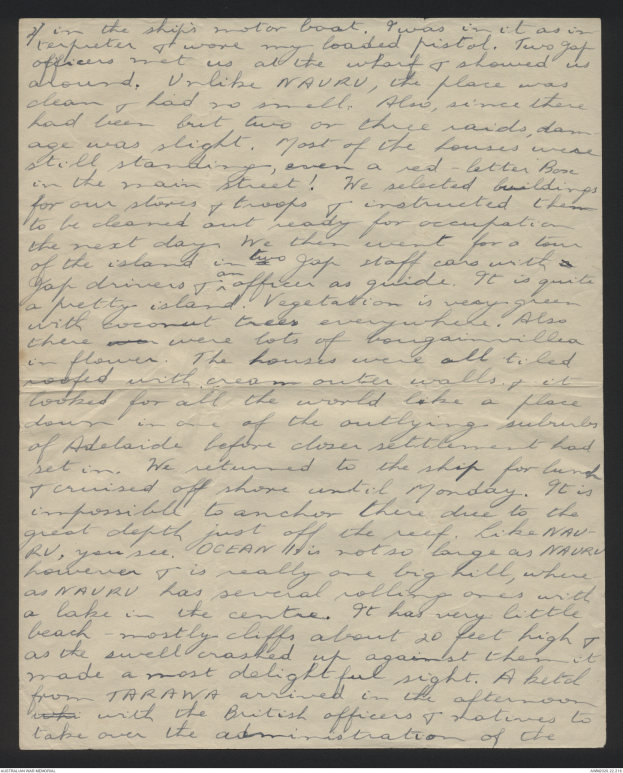
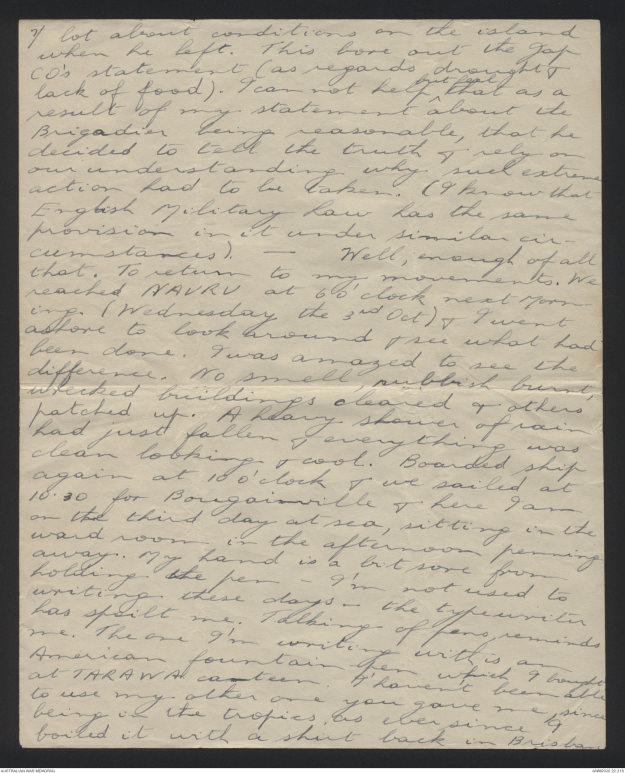
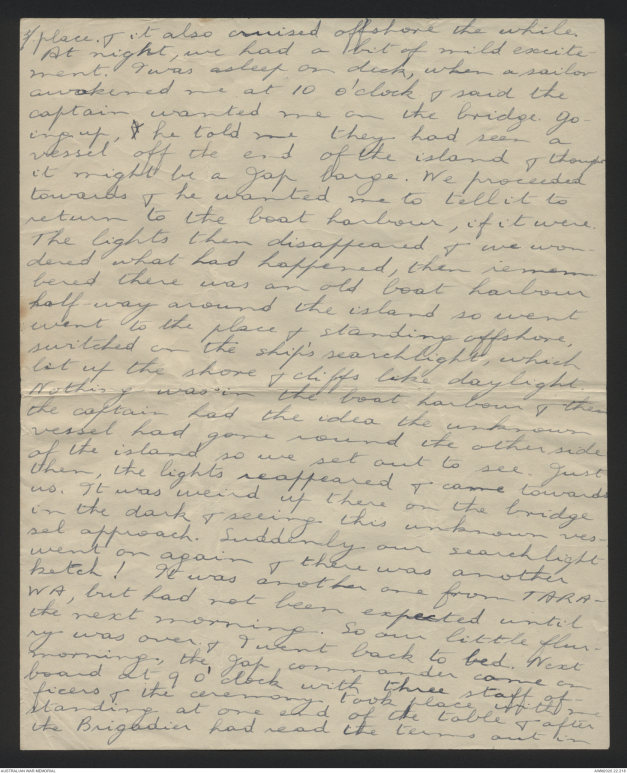
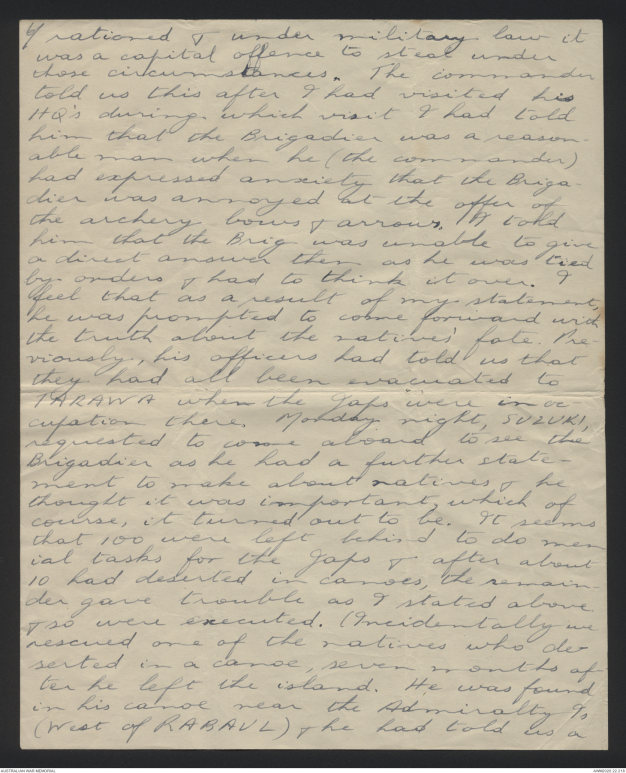
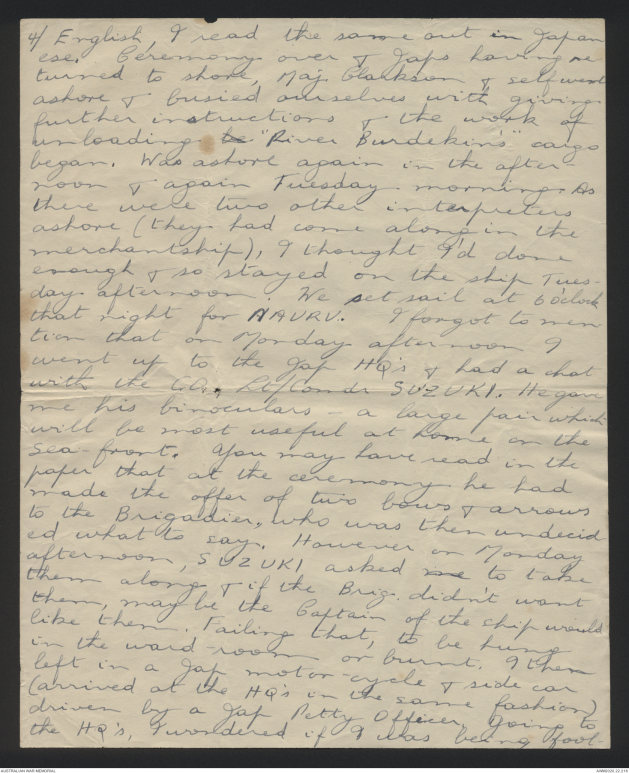
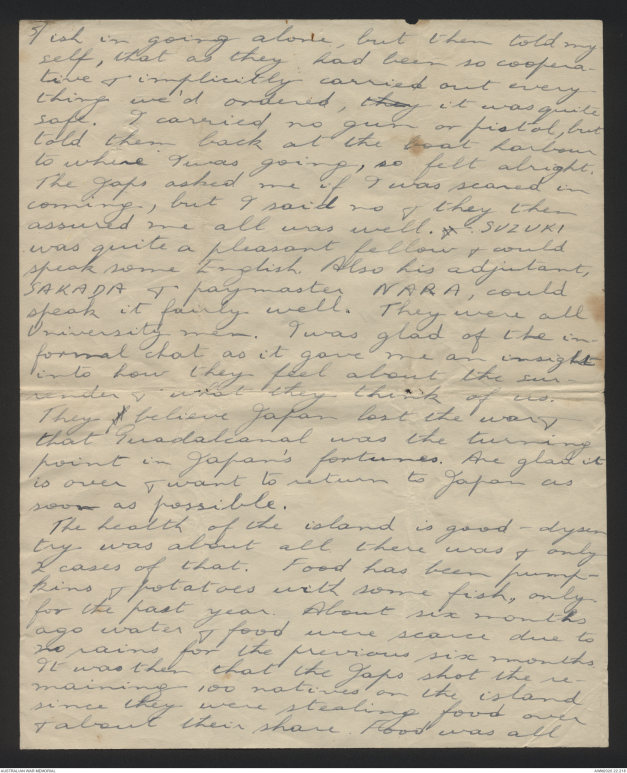
2 in the ship's motor boat. I was in it as interpreter
& wore my loaded pistol. Two Jap
officers met us at the wharf & showed us
around. Unlike NAURU, the place was
clean & had no smell. Also, since there
had been but two or three raids, damage
was slight. Most of the houses were
still standing, even a red-letter Box
in the main street! We selected buildings
for our stores & troops & instructed them
to be cleaned out ready for occupation
the next day. We then went for a tour
of the island in two Jap staff cars with a
Jap drivers & ^an officer as guide. It is quite
a pretty island. Vegetation is very green
with coconut trees everywhere. Also
there was were lots of bougainvillea
in flower. The houses were all tiled
roofed with cream outer walls & it
looked for all the world like a place
down in one of the outlying suburbs
of Adelaide before closer settlement had
set in. We returned to the ship for lunch
& cruised off shore until Monday. It is
impossible to anchor there due to the
great depth just off the reef. Like NAURU,
you see, OCEAN Is is not so large as NAURU
however & is really one big hill, where
as NAURU has several rolling ones with
a lake in the centre. It has very little
beach - mostly cliffs about 20 feet high &
as the swell crashed up against them it
made a most delightful sight. A ketch
from TARAWA arrived in the afternoon
whi with the British officers & natives to
take over the administration of the
7/ lot about conditions on the island
when he left. This bore out the Jap
CO's statement (as regards drought &
lack of food). I cannot help ^but feel that as a
result of my statement about the
Brigadier being reasonable, that he
decided to tell the truth & rely on
our understanding why such extreme
action had to be taken. (I know that
English Military Law has the same
provision in it under similar
circumstances) - Well, enough of all
that. To return to my movements. We
reached NAURU at 6 o'clock next morning.
(Wednesday the 3rd Oct) & I went
ashore to look around & see what had
been done. I was amazed to see the
difference. No smell, rubbish burnt,
wrecked buildings cleared & others
patched up. A heavy shower of rain
had just fallen & everything was
clean looking & cool. Boarded ship
again at 10 o'clock & we sailed at
10.30 for Bougainville & here I am
on the third day at sea, sitting in the
ward room in the afternoon penning
away. My hand is a bit sore from
holding the pen - I'm not used to
writing these days - the typewriter
has spoilt me. Talking of pens, reminds
me. The one I'm writing with is an
American fountain pen which I bought
at TARAWA canteen. I haven't been able
to use my other one you gave me since
being in the tropics, as ever since I
boiled it with a shirt back in Brisbane
3/ place & it also cruised offshore the while.
At night, we had a bit of mild excitement.
I was asleep on deck, when a sailor
awakened me at 10 o'clock & said the
captain wanted me on the bridge. Going
up, I he told me they had seen a
vessel off the end of the island & thought
it might be a Jap barge. We proceeded
towards & he wanted me to tell it to
return to the boat harbour, if it were.
The lights then disappeared & we
wondered what had happened, then
remembered there was an old boat harbour
half-way around the island so went
went to the place & standing offshore,
switched on the ship's searchlight, which
lit up the shore & cliffs like daylight.
Nothing was in the boat harbour & then
the captain had the idea the unknown
vessel had gone round the other side
of the island so we set out to see. Just
then, the lights reappeared & came towards
us. It was weird up there on the bridge
in the dark & seeing this unknown vessel
approach. Suddenly our searchlight
went on again & there was another
ketch! It was another one from TARAWA,
but had not been expected until
the next morning. So our little flurry
was over & I went back to bed. Next
morning, the Jap commander came on
board at 9 o'clock with three staff
officers & the ceremony took place with me
standing at one end of the table & after
the Brigadier had read the terms out in
6/ rationed & under military law it
was a capital offence to steal under
those circumstances. The commander
told us this after I had visited his
HQ's during which visit I had told
him that the Brigadier was a reasonable
man when he (the commander)
had expressed anxiety that the Brigadier
was annoyed at the offer of
the archery bows & arrows. I told
him that the Brig was unable to give
a direct answer then as he was tied
by orders & had to think it over. I
feel that as a result of my statement,
he was prompted to come forward with
the truth about the native's fate.
Previously, his officers had told us that
they had all been evacuated to
TARAWA when the Japs were in
occupation there. Monday night, SUZUKI,
requested to come aboard to see the
Brigadier as he had a further statement
to make about natives & he
thought it was important, which of
course, it turned out to be. It seems
that 100 were left behind to do menial
tasks for the Japs & after about
10 had deserted in canoes, the remainder
gave trouble as I stated above
& so were executed. (Incidentally we
rescued one of the natives who
deserted in a canoe, seven months
after he left the island. He was found
in his canoe near the Admiralty Is
(West of RABAUL) & he had told us a
4/ English, I read the same out in Japanese.
Ceremony over & Japs having returned
to shore, Maj. Clarkson & self went
ashore & busied ourselves with giving
further instructions & the work of
unloading be "River Burdekin's" cargo
began. Was ashore again in the afternoon
& again Tuesday morning. As
there were two other interpreters
ashore (they had come along in the
merchantship), I thought I'd done
enough & so stayed on the ship Tuesday
afternoon. We set sail at 6 o'clock
that night for NAURU. I forgot to mention
that on Monday afternoon I
went up to the Jap HQ's & had a chat
with the C.O, Lt/Comdr SUZUKI. He gave
me his binoculars - a large pair which
will be most useful at home on the
sea-front. You may have read in the
paper that at the ceremony he had
made the offer of two bows & arrows
to the Brigadier, who was then undecided
what to say. However on Monday
afternoon, SUZUKI asked me to take
them along & if the Brig. didn't want
them, maybe the Captain of the ship would
like them. Failing that, to be hung
in the ward-room or burnt. I then
left in a Jap motor-cycle & side car
(arrived at the HQ's in the same fashion)
driven by a Jap Petty Officer, going to
the HQ's & wondered if I was being foolish
5/ in going alone, but then told myself,
that as they had been so cooperative
& implicitly carried out everything
we'd ordered, they it was quite
safe. I carried no gun or pistol, but
told them back at the boat harbour
to where I was going, so felt alright.
The Japs asked me if I was scared in
coming, but I said no & they then
assured me all was well. X SUZUKI
was quite a pleasant fellow & would
speak some English. Also his adjutant,
SAKADA & paymaster NARA, could
speak it fairly well. They were all
university men. I was glad of the
informal chat as it gave me an insight
into how they feel about the
surrender & what they think of us.
They I believe Japan lost the war &
that Guadalcanal was the turning
point in Japan's fortunes. Are glad it
is over & want to return to Japan as
soon as possible.
The health of the island is good -
dysentry was about all there was & only
2 cases of that. Food has been pumpkins
& potatoes with some fish, only
for the past year. About six months
ago water & food were scarce due to
no rains for the previous six months.
It was then that the Japs shot the
remaining 100 natives on the island
since they were stealing food over
& above their share. Food was all
 Kimberley Hayes
Kimberley Hayes This transcription item is now locked to you for editing. To release the lock either Save your changes or Cancel.
This lock will be automatically released after 60 minutes of inactivity.